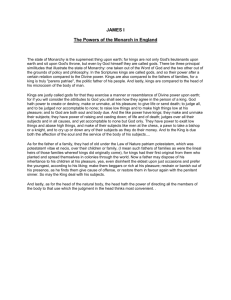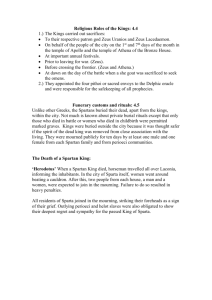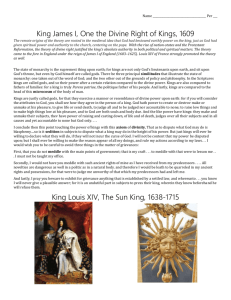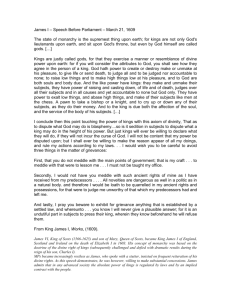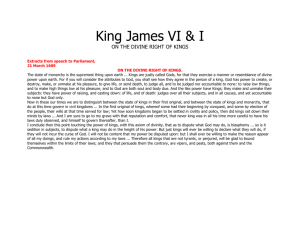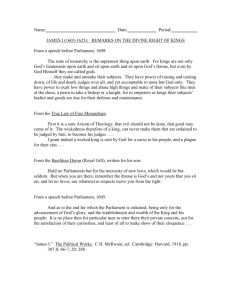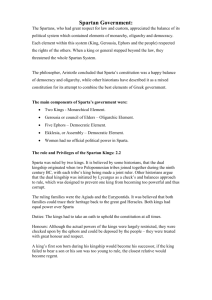Sparta notes monarchy
advertisement
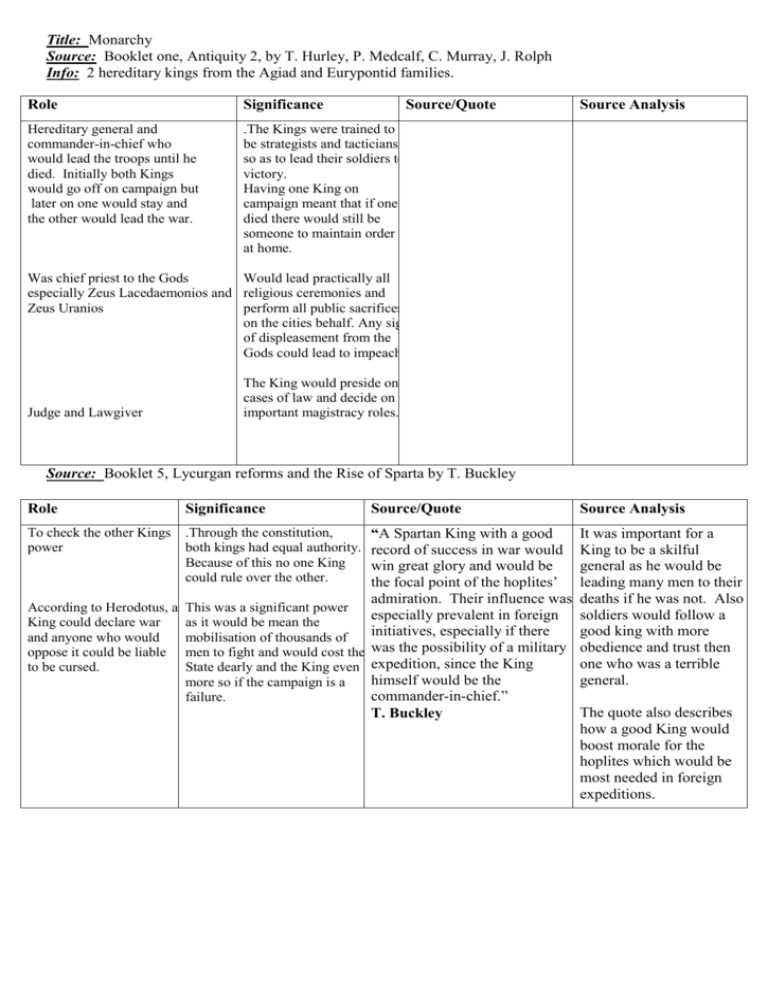
Title: Monarchy Source: Booklet one, Antiquity 2, by T. Hurley, P. Medcalf, C. Murray, J. Rolph Info: 2 hereditary kings from the Agiad and Eurypontid families. Role Significance Source/Quote Hereditary general and commander-in-chief who would lead the troops until he died. Initially both Kings would go off on campaign but later on one would stay and the other would lead the war. .The Kings were trained to be strategists and tacticians so as to lead their soldiers to victory. Having one King on campaign meant that if one died there would still be someone to maintain order at home. Source Analysis Was chief priest to the Gods Would lead practically all especially Zeus Lacedaemonios and religious ceremonies and Zeus Uranios perform all public sacrifices on the cities behalf. Any signs of displeasement from the Gods could lead to impeachment Judge and Lawgiver The King would preside on cases of law and decide on important magistracy roles. Source: Booklet 5, Lycurgan reforms and the Rise of Sparta by T. Buckley Role Significance Source/Quote “A Spartan King with a good record of success in war would win great glory and would be the focal point of the hoplites’ admiration. Their influence was According to Herodotus, a This was a significant power especially prevalent in foreign King could declare war as it would be mean the initiatives, especially if there and anyone who would mobilisation of thousands of oppose it could be liable men to fight and would cost the was the possibility of a military to be cursed. State dearly and the King even expedition, since the King himself would be the more so if the campaign is a commander-in-chief.” failure. T. Buckley To check the other Kings power .Through the constitution, both kings had equal authority. Because of this no one King could rule over the other. Source Analysis It was important for a King to be a skilful general as he would be leading many men to their deaths if he was not. Also soldiers would follow a good king with more obedience and trust then one who was a terrible general. The quote also describes how a good King would boost morale for the hoplites which would be most needed in foreign expeditions. Source: Booklet eight, Social Order and the Conflict of Values in Classical Sparta S. Hodkinson Roles Significance Source/Quote Source analysis Arrange marriages for a The kings would preside heiress if her father has not on occasions concerning done so and preside over the procreation of occasions where a Spartiate Spartiates. adopts a son. The Kings sit with the elders The Kings were given in the Gerousia equal powers with the Gerousia in their dealings. Source: Booklet 7, The Spartan State by Hooker Source/Quote Source Analysis King Agesilaos to Xenephon “the lesson most studied at Sparta, how to rule and be ruled” Being a good King in Sparta was important as in the end it was not the King who ruled the State but the people, if the people grew discontent with the King, the King could be impeached. Monarchs in Sparta always had their powers checked by different institutions, be it the Gerousia, the Ephors or the Apella and it was in their best interests not to go against them Source: P. Valenti study day booklet Role Significance Custodians of the Oracles The Oracles were the messengers of the Gods, being the custodians meant that the Kings were the caretakers of the Gods messengers, an honour highly regarded in Greece Received foreign ambassadors and officials Fact that ambassadors and officials went to the Kings meant that the Monarchy held a high standing amongst the Greeks. Received twice as much food as an other Spartiate They were above other Spartiates, regarded as superior due to their heritage and deemed necessary to be fed more. Source/Quote Relevance “…Instituted the Ephors whose powers he made to resemble that of magistrates elected by lot; and by this arrangement the Kingly office…was preserved, and was the means of preserving the rest” Plato It was the inclusion of the democratic element of the Ephorate that allowed the Monarchy to be preserved as the people could check the Kings’ power. This can also be seen in the way that the Ephors do not rise to the Kings when they, the kings, enter before them.
